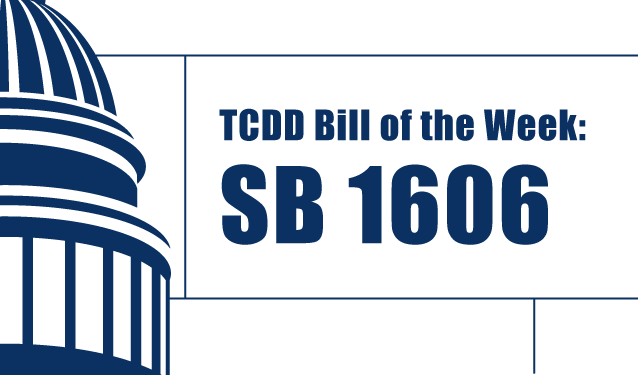SB 1606
SB 1606

For this weekly feature, we profile a noteworthy bill that is going through the legislative process. The bill may relate directly to TCDD’s Public Policy Priorities or another disability-related issue.
Table of Contents
Bill: Senate Bill (SB) 1606, relating to evidence and orders regarding intellectual disability or mental condition in certain guardianship proceedings.
Bill Author: Sen. Judith Zaffirini, Senate District 21 (Laredo)
Share This Bill
We’ve created a Bill of the Week one-pager (PDF) for SB 1606. This is a simplified explanation of the bill that you can share with your representative and personal network.
Background
The Governor’s Committee on People with Disabilities (GCPD) defines guardianship (PDF) in the following way:
Guardianship is a legal tool which allows a person to make decisions for another person. It removes the civil rights and privileges of a person by assigning control of their life to someone else. The need for guardianship may come from a person’s age, disability, or injury. Guardianship provides for the person’s care and management of their money while preserving, to the largest extent possible, that person’s independence and right to make decisions affecting their life.
A guardianship should be only as restrictive as indicated by the person’s actual mental or physical limitations; and as necessary to promote and protect their well-being. For many individuals, guardianship may be an appropriate option, however, per changes in the law in 2015 and 2017, alternatives to guardianship, like supported decision-making agreements, are not only viable solutions but must be considered before guardianship is granted.
Advocates argue that it’s crucial for everyone involved in the guardianship process to be trained to help families choose the best option. Guardianships are difficult to change once they’re in place, and it can be even harder for people under guardianship to regain their full rights.
What does the bill do?
SB 1606 would establish that doctors or psychologists examining people with intellectual disabilities during guardianship proceedings must preferably have experience examining people with intellectual disabilities. The bill, which would amend the Texas Estates Code, specifies that doctors or psychologists would meet this requirement if they already have patient-provider relationships with the people they examine.
SB 1606 would create a new process in guardianship proceedings that involve people with intellectual disabilities, specifically those that would restore a person’s rights or modify an existing guardianship, including allowing psychologists and not just doctors to administer the examinations used to determine capacity. In proceedings involving people with intellectual disabilities, the bill would require a letter or certificate from a doctor licensed in Texas or a psychologist licensed or certified by the Texas Health and Human Services Commission to conduct such examinations. The letter or certificate must:
- include a statement on whether the person has the capacity or sufficient supports and services to provide their own basic needs and manage their physical health and financial affairs;
- describe how the person’s ability to make reasonable decisions is affected by their mental capacity; and
- be dated either (A) no earlier than 120 days before the guardianship application was filed, or (B) after the application date but before the guardianship hearing date.
The doctor or psychologist providing this information should preferably have experience examining people with intellectual disabilities, according to SB 1606. Again, if the doctor or psychologist has an established patient-provider relationship with the person in question, then they would be considered to have such experience.
Additionally, the bill removes an existing requirement that an order restoring a person’s rights — in instances where the person’s incapacity resulted from a mental condition — must explicitly state that their mental capacity has been fully restored.
If passed, SB 1606 would take effect on Sept. 1, 2023. The bill would apply to applications for guardianship, restoration, or modification filed after the effective date.


Statement from Sen. Judith Zaffirini, bill author:
“Guardianship should be only as restrictive as indicated by the person’s actual mental or physical limitations and is necessary to promote and protect their well-being. Accordingly, it is important that all parties involved in the guardianship process be trained to help families select the best option for their family member with a disability.”
Where is the bill in the process?
SB 1606 was passed by the Senate on April 25, and by the House on May 24. It now heads to the governor’s desk for signature into law.
The bill received a public hearing before the Senate State Affairs Committee on April 11. You can watch the discussion on it here, beginning at the 26:05 mark.
The bill received a public hearing before the House Judiciary and Civil Jurisprudence Committee on May 10. You can watch the discussion on it here, beginning at the 16:15 mark.
Who supports the bill and why?
The following comments were provided at the April 11 hearing on SB 1606:
- DRTx: Jeff Miller of Disability Rights Texas (DRTx) testified in favor of the bill. He referenced a workgroup on guardianship recently convened by the GCPD, citing the rationale behind its recommendations that led to the bill. Miller stated that, “because so much emphasis is put on the medical evaluation that’s used in establishing a guardianship and in trying to restore someone’s rights, it was so important that the medical professional conducting that evaluation be the right kind of medical professional.” In keeping with this, the workgroup felt that “if we are talking about someone that has an intellectual disability, [then] a psychologist should be included in providing evidence around capacity for restoration’s sake.” The workgroup also felt it important that the medical professional have awareness of intellectual disability if that is the basis for the guardianship proceeding.
- Family Member: Ellen Bauman, a member of the GCPD and chair of its recent workgroup on guardianship, spoke on behalf of herself in support of the bill. She explained the difficulty of getting people removed from guardianship after they have been wrongfully placed in one, which is something she has encountered with loved ones.
- The Arc of Texas: Ashley Ford, director of public policy and advocacy for The Arc of Texas, provided testimony in support of the bill. She stated: “Guardianship is very serious business, and whenever we are considering removing someone’s civil rights, we should absolutely ensure that the folks that are making those recommendations have the proper credentials to do so.”
The following groups registered in support of the bill: the Coalition of Texans with Disabilities, Statutory Probate Courts of Texas, Texas Council of Community Centers, Texas Parent to Parent, and Texas Psychological Association.
Who opposes the bill and why?
Over the course of the two hearings on SB 1606, opposition was registered by Parents and Allies for Remarkable Texans and by one individual, but neither provided testimony.
Additional Testimony
The following comment was provided at the April 11 hearing on SB 1606:
- TCDD: Lauren Gerken, public policy analyst for TCDD, submitted written remarks on the bill. Gerken noted that the lack of explicit requirements for doctors to have IDD experience if charged with determining incapacity has led to inconsistent evaluations. She emphasized the importance of involving medical professionals with a deep understanding of IDD to ensure that guardianship is the most appropriate option and to provide individuals with IDD the best possible care. Gerken stated: “To ensure that guardianship is in fact the only and best option for the individual, that person deserves access to a medical professional who possesses a deep understanding of IDD.“ She continued: “The family or loved ones pursuing guardianship also deserve the most accurate forecast, as it may lead to options they were not informed about by other professionals.”
Additional Information
TCDD adopted language on guardianship practices and guardianship information access in our 2023 Public Policy Priorities.
The GCPD included the following language in its 2024-2025 Policy Recommendations Report to the 88th Texas Legislature (PDF, 674 KB, 75 pages):
Recommendation 6.14: Ensure the physician completing the Certificate of Medical Evaluation (CME) is qualified to perform the capacity and functioning evaluation.
Recommendation 6.16: Allow licensed psychologists the authority to offer evidence in restoration and/or modification hearings for individuals with IDD.
How much will the bill cost?
The Legislative Budget Board found SB 1606 would not impact the state budget in a significant way.
Is there a Senate companion to the bill?
There is no House companion to SB 1606.
Stay Informed
For the latest information about where SB 1606 is in the process, follow the bill on the Texas Legislature Online. To receive future legislative updates from TCDD follow us on Twitter, Facebook, Instagram, and LinkedIn.
Disability Policy Academy
For a broader rundown of the legislative session, join TCDD on Wednesday, June 14, for a Disability Policy Academy titled, “A Capitol Recap: Disability Policy in the 88th Legislature.” The event will be held via Zoom, is open to the public, and is free to attend. Participants must register online ahead of time. The registration period has ended. Visit the Disability Policy Academy to learn more.
Communication Access Real-time Translation (CART) service will be provided. If you need other accommodations to participate, please email Koren Vogel or contact her at 512-948-2035.
